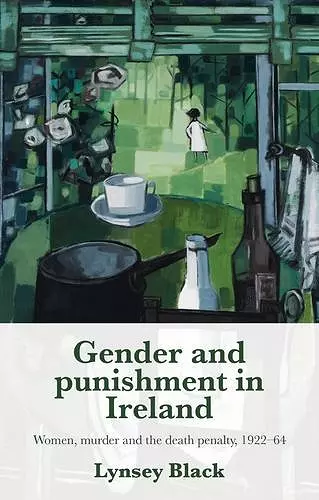Gender and Punishment in Ireland
Women, Murder and the Death Penalty, 1922–64
Format:Hardback
Publisher:Manchester University Press
Published:21st Apr '22
Should be back in stock very soon

Gender and punishment in Irelandexplores women’s lethal violence in Ireland. Drawing on comprehensive archival research, including government documents, press reporting, the remnants of public opinion and the voices of the women themselves, the book contributes to the burgeoning literature on gender and punishment and women who kill. Engaging with concepts such as ‘double deviance’, chivalry, paternalism and ‘coercive confinement’, the work explores the penal landscape for offending women in postcolonial Ireland, examining in particular the role of the Catholic Church in responses to female deviance. The book is an extensive interdisciplinary treatment of women who kill in Ireland and will be useful to scholars of gender, criminology and history.
‘Beautifully written and comprehensively researched, this book is a vital addition to historical and criminological work on women, murder and punishment. Extending the literature on women who kill, Black goes beyond a focus on gender representation alone to examine the complex dynamics that influenced conviction, sentencing and punishment of women accused of murder in Ireland in the decades after independence. Distinct from existing research on women accused of murder, she traces their experiences of punishment, including what happened to women reprieved from the death penalty. A particularly fascinating aspect of Gender and punishment in Ireland is Black's analysis of the use of religious detention in Ireland's “shadow system of penalty” as a disposal, which further develops feminist penology on gender and mixed economies of punishment. As such, this book is highly recommended for its combination of rigorous empirical research and fresh conceptual insight.’
Professor Lizzie Seal, University of Sussex
'Black has provided an extensive and close reading of court records, including trial record books, case files, the state books for the Central Criminal Court, relevant files from the Department of the Taoiseach and newspaper accounts of trials. The book is a major intervention into studies of crime and criminality in post-Independence Ireland and forms the basis for comparative work with other countries. It is informative, well structured, well written and conceptually sophisticated.'
Maria Luddy, University of Warwick, Women's History Review
This book contributes to an international literature on histories and practices of capital punishment. It also adds to a growing literature presenting the history of Irish criminal justice as a distinct object of study. And Black’s book makes a significant contribution here. One of the questions Black sets out in the introduction is whether the theoretical literature on state responses to women who kill can be universalized. While this book’s argument fundamentally requires Irish women’s experiences to be taken on their own terms, in setting out exactly how these experiences were unique, it also makes major contributions to the relevant literature well beyond Ireland.'
Kay Crosby, Newcastle University, The Journal of Legal History
'Gender and Punishment in Ireland blends historiography, case studies and legal analysis in a skilfully woven narrative, making a rather heavy topic into a great read.... This will be essential reading on many courses in Ireland (both in history and in law) but will appeal beyond that to all interested in the ways in which women's criminality has differed to men's over time, including the different ways they were punished.'
Dr Jennifer Redmond, Irish Economic and Social Review
'Lynsey Black’s well-defined monograph on women who murder reveals a complex web of leniency, paternalistic assumptions, and gendered values behind the sentencing and punishment of women charged with murder in post-independence Ireland… Black’s incisive research extends the relevance of this topic into a microcosm of Irish nation-building through complex negotiations of womanhood, violence, and culpability… What truly sets this research apart, however, is Black’s ability to contextualize this niche sample of women’s experiences into historiographical conversations on gender in the broader contexts of Irish national identity, religious confinement, infanticide, and the urban/rural divide. These connections shed new light on the study of women’s lethal violence.'
Emma Quinn, Estudios Irlandeses
ISBN: 9781526145284
Dimensions: 216mm x 138mm x 19mm
Weight: 508g
312 pages